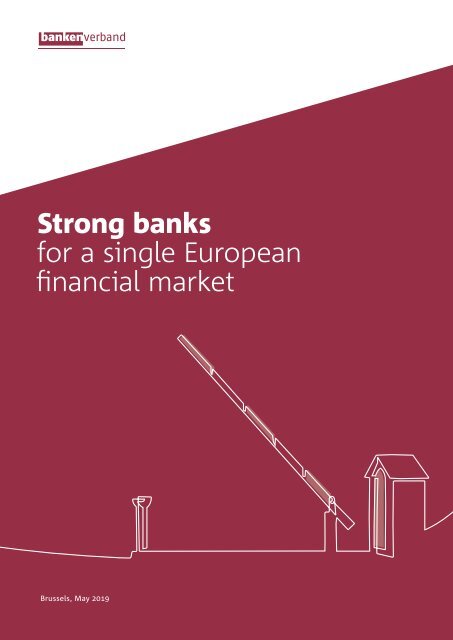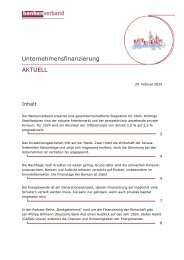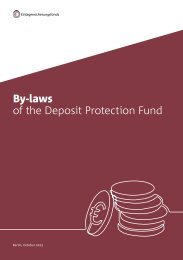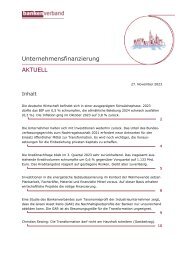Strong banks for a single European financial market
The last few years have seen the EU take its first steps towards establishing a single European financial market. But these aren`t yet enough! In the following pages, we outline measures that will help to create a single European market.
The last few years have seen the EU take its first steps towards establishing a single European financial market. But these aren`t yet enough! In the following pages, we outline measures that will help to create a single European market.
You also want an ePaper? Increase the reach of your titles
YUMPU automatically turns print PDFs into web optimized ePapers that Google loves.
<strong>Strong</strong> <strong>banks</strong><br />
<strong>for</strong> a <strong>single</strong> <strong>European</strong><br />
<strong>financial</strong> <strong>market</strong><br />
Brussels, May 2019
Contents<br />
Private <strong>banks</strong> <strong>for</strong> a <strong>single</strong> <strong>European</strong> <strong>financial</strong> <strong>market</strong> 4<br />
The way <strong>for</strong>ward towards a <strong>single</strong> <strong>European</strong> <strong>financial</strong> <strong>market</strong> 5<br />
1. Banking union 6<br />
2. Capital <strong>market</strong>s union 8<br />
3. General private law 10<br />
4. Digitalisation 11<br />
5. Sustainable finance 13<br />
6. Consumer protection 14<br />
7. Taxation 14
Private <strong>banks</strong> <strong>for</strong><br />
a <strong>single</strong> <strong>European</strong><br />
<strong>financial</strong> <strong>market</strong><br />
The last few years have seen the EU take its first steps<br />
towards establishing a <strong>single</strong> <strong>European</strong> <strong>financial</strong><br />
<strong>market</strong>. But these aren’t yet enough!<br />
Only a <strong>single</strong> <strong>financial</strong> <strong>market</strong> with strong <strong>banks</strong> of its own<br />
will enable us to safeguard <strong>European</strong> values and interests<br />
in a global environment.<br />
A completed <strong>single</strong> <strong>financial</strong> <strong>market</strong> will have two crucial<br />
advantages: on the one hand, retail customers and businesses<br />
will have access to <strong>financial</strong> services from all parts of<br />
the <strong>European</strong> Union. On the other hand, <strong>European</strong> <strong>banks</strong> will<br />
be able to offer their products efficiently in a large <strong>market</strong>,<br />
thus benefiting from economies of scale and increasing<br />
their profitability.<br />
In our view, customers in Europe should find it perfectly natural<br />
to get banking services from all over Europe – whether<br />
it be a customer from Spain who wants to buy products<br />
from a bank in France, a customer from Italy who wants to<br />
make a deposit at a German bank or an investor from the<br />
Netherlands who wants to place an order <strong>for</strong> securities at<br />
a bank in Luxembourg.<br />
To create a <strong>single</strong> <strong>financial</strong> <strong>market</strong>, EU rules and regulations<br />
must be further harmonised. We don’t just need harmonisation<br />
of rules in classic banking-related areas, such as those<br />
covered by banking union and capital <strong>market</strong>s union, but<br />
harmonisation of a much more far-reaching kind. General<br />
provisions of private law must also be harmonised, <strong>for</strong><br />
example. And in new fields, such as digitalisation or the<br />
<strong>market</strong> <strong>for</strong> sustainable products, we need to ensure from<br />
the outset that we do not end up with a patchwork regime.<br />
In the following pages, we outline measures that will help<br />
to create a <strong>single</strong> <strong>European</strong> <strong>financial</strong> <strong>market</strong>.<br />
Europe needs competitive and profitable pan-<strong>European</strong><br />
<strong>banks</strong> of its own that support the <strong>European</strong> economy. Banks<br />
in Europe have built up long-term customer relationships,<br />
know the <strong>market</strong>s and can there<strong>for</strong>e provide their customers<br />
with competent advice. They also share common values on<br />
matters such as data protection.<br />
4 Private <strong>banks</strong> <strong>for</strong> a <strong>single</strong> <strong>European</strong> <strong>financial</strong> <strong>market</strong>
The way <strong>for</strong>ward towards a <strong>single</strong> <strong>European</strong> <strong>financial</strong> <strong>market</strong><br />
1. Banking union<br />
• More use of EU regulations<br />
• Reduce national discretions<br />
• Establish cross-border capital and<br />
liquidity waivers<br />
• Recognise banking union as a <strong>single</strong> jurisdiction<br />
<strong>for</strong> intragroup exposures<br />
• Define responsibilities of supervisory authorities<br />
more precisely<br />
• Strengthen the powers of the ESAs on <strong>European</strong> issues<br />
• Uni<strong>for</strong>mly define <strong>financial</strong> data reporting points<br />
4. Digitalisation<br />
• Strengthen basis <strong>for</strong> digitalisation<br />
• Establish new technology-neutral EU-wide rules<br />
• Transfer analogue rules to the digital world<br />
• Adopt uni<strong>for</strong>m EU-wide definitions and guidelines <strong>for</strong><br />
outsourcing<br />
• Harmonise digital onboarding (KYC rules)<br />
• Avoid distortion of competition through asymmetric<br />
data access by big techs and <strong>banks</strong><br />
• Make in<strong>for</strong>mation to customers on use of their data<br />
clear and concise<br />
2. Capital <strong>market</strong>s union<br />
• New approach<br />
• Strengthen equity culture<br />
• Expand capital-<strong>market</strong>-based provision <strong>for</strong><br />
old age<br />
• No rigid product rules<br />
• Establish uni<strong>for</strong>m EU-wide procedures <strong>for</strong><br />
banning products<br />
• Harmonise processes <strong>for</strong> refunding withholding<br />
tax on income from securities<br />
• Complete securitisation framework and ensure it<br />
meets <strong>market</strong> needs<br />
3. General private law<br />
• Harmonise general private law<br />
• Harmonise insolvency law<br />
• No national “gold-plating”<br />
• EU-wide data <strong>for</strong>mat <strong>for</strong> credit assessment<br />
5. Sustainable finance<br />
• Uni<strong>for</strong>m taxonomies<br />
• EBA studies on potential capital relief and new risk<br />
categories advisable<br />
6. Consumer protection<br />
• Allow a legally sound, uni<strong>for</strong>m EU-wide “right of<br />
withdrawal” clause<br />
• Reduce superfluous customer in<strong>for</strong>mation<br />
• Create a uni<strong>for</strong>m EU-wide level of consumer<br />
protection<br />
• Review MiFiD II and its excessive requirements <strong>for</strong><br />
<strong>banks</strong> and customers<br />
7. Taxation<br />
• Drop the idea of a <strong>financial</strong> transaction tax<br />
• Harmonise business taxes in the EU<br />
Red bullet points are covered by this paper.<br />
Private <strong>banks</strong> <strong>for</strong> a <strong>single</strong> <strong>European</strong> <strong>financial</strong> <strong>market</strong> 5
1. Banking<br />
union<br />
Moving <strong>for</strong>ward on banking union is one of<br />
the central concerns of the <strong>European</strong> Union<br />
and, in our view, key to establishing a <strong>single</strong><br />
banking <strong>market</strong> which is fit <strong>for</strong> the future. Despite a Single<br />
Supervisory Mechanism (SSM) and various harmonisation<br />
projects, <strong>European</strong> <strong>banks</strong> still face considerable national<br />
differences. These differences keep them from offering<br />
their services EU-wide, especially in those member states<br />
which have a less well-developed banking landscape and<br />
rely on lending from abroad. Big <strong>banks</strong> in particular, which<br />
are subject to common cross-border supervision within<br />
the banking union, should there<strong>for</strong>e also be enabled to<br />
do business across borders. To allow this, it is vital that<br />
harmonisation of regulation is driven <strong>for</strong>ward and that the<br />
rules are applied uni<strong>for</strong>mly by supervisors.<br />
be<strong>for</strong>e they can, <strong>for</strong> example, engage in cross-border lending<br />
to small and medium-sized businesses. Furthermore, they<br />
will have to continuously monitor changes at national level<br />
and implement these, both at considerable cost, if they want<br />
to carry on doing business. This high barrier to cross-border<br />
business, which artificially limits product diversity <strong>for</strong><br />
<strong>European</strong> customers, can only be overcome by gradually<br />
harmonising the regulatory and supervisory framework.<br />
Example: O&Ds<br />
The number of national options and discretions (O&Ds)<br />
should be brought down in the long term, since they tend<br />
to result in a patchwork of rules that makes it more difficult<br />
<strong>for</strong> <strong>banks</strong> to set up centrally managed units <strong>for</strong> the entire<br />
EU and exploit synergy effects.<br />
Example: regulations<br />
Better harmonisation could be achieved by making greater<br />
use of regulations instead of directives, which have to be<br />
implemented in national law. Take the CRD: as a result of<br />
differing implementation of the CRD, the term “lending<br />
business” (Kreditgeschäft) used in Germany differs from<br />
definitions in other member states.<br />
Without any further progress on harmonisation, <strong>banks</strong> will<br />
be <strong>for</strong>ced to continue thoroughly familiarising themselves<br />
with the different national rules and supervisory practices<br />
In order to progress towards a <strong>single</strong> <strong>financial</strong> <strong>market</strong>,<br />
cross-border banking groups should be able to handle their<br />
capital and associated regulatory requirements, such as<br />
those <strong>for</strong> large exposures, centrally at group level. Currently,<br />
<strong>banks</strong> have to manage requirements both at group level and,<br />
<strong>for</strong> their subsidiaries, at various national levels as well. This<br />
ties up capital and liquidity and prevents these resources<br />
from being used efficiently. In a Europe that wants to create<br />
a <strong>single</strong> <strong>financial</strong> <strong>market</strong> and in which banking groups are<br />
already subject to <strong>single</strong> supervision and resolution mechanisms,<br />
there is no reason to withhold cross-border waivers.<br />
Banking union
Example: waivers<br />
With the help of cross-border capital and liquidity waivers,<br />
<strong>banks</strong> could deploy capital in Europe where it is needed<br />
to generate economic growth. We estimate that billions<br />
of Euro of regulatory capital and liquidity could be freed<br />
up <strong>for</strong> the G-SIBs of the Eurozone alone.<br />
would be significant administrative relief <strong>for</strong> <strong>banks</strong> and customers.<br />
When setting up a central repository of this kind,<br />
however, it will be essential to ensure that data requests from<br />
other sources are simultaneously dropped. Otherwise, we<br />
will merely end up adding a further layer to an even more<br />
expensive and convoluted regime.<br />
The reporting regime has been repeatedly extended and,<br />
at some <strong>banks</strong>, the number of staff handling reporting has<br />
doubled despite the general cutback in personnel. This raises<br />
the pressing question of whether the more than 60,000 data<br />
fields that supervisors can ask <strong>banks</strong> to complete in the context<br />
of FINREP alone can be evaluated in an effective way at<br />
all, or whether it is not time to limit ourselves to less, but<br />
more meaningful and standardised data. The first step should<br />
be to establish standardised definitions of the data involved.<br />
At present, the in<strong>for</strong>mation reported by <strong>banks</strong> in different<br />
member states sometimes differs widely. We would also recommend<br />
that the various national and <strong>European</strong> authorities<br />
coordinate their data requests much better. New solutions are<br />
needed to reduce overlaps when drawing up and applying<br />
reporting requirements. Ideally, a central, EU-wide data repository<br />
should be established. Be<strong>for</strong>e issuing new requests <strong>for</strong><br />
data, supervisory authorities could check to see whether the<br />
desired data already existed. This would allow authorities<br />
to access existing data more quickly and <strong>banks</strong> would not<br />
need to complete new data fields unnecessarily. The result<br />
Example: definitions<br />
While <strong>banks</strong> in some member states report loan-to-value<br />
ratios using the purchase price of property as the basis<br />
<strong>for</strong> their calculations, Germany takes a more conservative<br />
approach and uses the collateral value. As a result, the<br />
reported data is not really comparable.<br />
Banks also face the problem of having to constantly make<br />
adjustments in response to new reporting requirements,<br />
thus tying up a large part of their IT budget. Even small<br />
changes can be time-consuming and costly, as they have to<br />
be thoroughly tested to see how they interact with the rest<br />
of the system. These resources could be better invested in<br />
developing digital innovations.<br />
Example: adjustments<br />
More long-term planning should go into reporting requirements<br />
and changes should be consolidated and introduced<br />
throughout Europe on certain predefined dates so as to<br />
keep the administrative workload manageable.<br />
Banking union 7
2. Capital<br />
<strong>market</strong>s<br />
union<br />
A<br />
stable <strong>single</strong> <strong>financial</strong> <strong>market</strong> requires both a<br />
functioning banking <strong>market</strong> and further integration<br />
of the <strong>European</strong> capital <strong>market</strong>. This is<br />
the only way to ensure that risks are spread evenly and<br />
appropriately among a number of <strong>market</strong> participants. Both<br />
<strong>market</strong>s unfold their effect together – they do not operate<br />
side-by-side in isolation. They have to complement each<br />
other in what they do.<br />
As part of its ef<strong>for</strong>ts to drive <strong>for</strong>ward capital <strong>market</strong>s union,<br />
the <strong>European</strong> Union has undertaken various measures<br />
that – taken individually or as a whole – are un<strong>for</strong>tunately<br />
unlikely to strengthen the <strong>European</strong> capital <strong>market</strong> and<br />
consolidate its integration in the long term. The EU has, in<br />
particular, failed to fully live up to its promise to focus on<br />
and foster the <strong>market</strong>. Not only the example of securitisation<br />
shows that there is a danger of regulation being adopted<br />
which ignores <strong>market</strong> needs. For this reason, fresh impetus<br />
is needed to create a capital <strong>market</strong>s union.<br />
Example: securitisation<br />
<strong>European</strong> regulation of securitisation should be designed in<br />
such a way that it can really lead to a responsible revival of<br />
the <strong>market</strong> – securitisations are a key instrument <strong>for</strong> linking<br />
financing by <strong>banks</strong> with the capital <strong>market</strong>s. Regulation<br />
which ignores <strong>market</strong> needs risks damaging the <strong>market</strong><br />
instead of reviving it.<br />
Capital <strong>market</strong>s union is intended to strengthen Europe’s<br />
position as a <strong>financial</strong> centre in a world of global competition,<br />
increase its appeal (competitiveness) and openness to<br />
<strong>for</strong>eign investors and thus attract capital and liquidity from<br />
abroad. Up to now, the City of London has played the primary<br />
role in achieving this. When the United Kingdom leaves<br />
the EU, we will lose this <strong>European</strong> <strong>financial</strong> centre, however.<br />
Though a comparable new centre cannot be created in the<br />
EU27 by legislation alone, the EU can, by furthering capital<br />
<strong>market</strong>s union, establish a better environment <strong>for</strong> attracting<br />
<strong>for</strong>eign capital. This will require the largest possible <strong>single</strong><br />
<strong>market</strong>, in which it is naturally <strong>market</strong> participants who<br />
compete to determine the failure or success of old and new<br />
players, products and locations.<br />
Example: withholding tax<br />
A continuing obstacle to cross-border transactions in the<br />
capital <strong>market</strong> is the different and complex processes and<br />
<strong>for</strong>ms in member states <strong>for</strong> obtaining refunds of withholding<br />
tax on income from securities. This hurdle on the road<br />
to capital <strong>market</strong>s union is also a worldwide obstacle to<br />
investment. In the medium term, it would benefit customers<br />
if these processes were simplified and harmonised.<br />
In the long term, refund processes and <strong>for</strong>ms could be<br />
replaced by the application under double taxation treaties<br />
of relief from withholding tax <strong>for</strong> the final beneficiary at<br />
the time of payment (relief at source).<br />
8 Capital <strong>market</strong>s union
As with banking union, a prerequisite <strong>for</strong> a smoothly<br />
functioning capital <strong>market</strong>s union is further progress in<br />
harmonising the legal basis across Europe in areas such<br />
as company law, insolvency law, accounting standards and<br />
taxation. It is important that regulation should become more<br />
uni<strong>for</strong>m too, but also considerably more consistent and predictable.<br />
This is the only way that <strong>banks</strong> will be able to adapt<br />
to regulatory requirements while at the same time focusing<br />
on refining their business models in an innovative manner.<br />
The development of products ideally available to all customers<br />
throughout Europe is a further key to the success of<br />
capital <strong>market</strong>s union. Policymakers would be well advised<br />
to refrain from the rigid regulation of products: we need<br />
uni<strong>for</strong>m framework conditions, not uni<strong>for</strong>m products. Market<br />
participants would then be able to compete throughout<br />
Europe and across borders to develop the right <strong>financial</strong><br />
solutions and products <strong>for</strong> the <strong>market</strong> and offer different<br />
products in different member states.<br />
particular, are still too reluctant to invest in capital <strong>market</strong>s.<br />
This hampers both the private build-up of assets and the<br />
funding of innovation. One reason <strong>for</strong> increasing reluctance<br />
among retail investors is the need to deal with cumbersome<br />
processes resulting from regulatory requirements, such as<br />
MiFiD II.<br />
Example: old-age provision<br />
Capital-<strong>market</strong>-based provision <strong>for</strong> old age cannot be<br />
increased with the help of EU products alone, but requires<br />
much better incentives to be set in member states. This<br />
is the only way to establish this key element of making<br />
secure provision <strong>for</strong> old age.<br />
Example: product bans<br />
To create a <strong>single</strong> capital <strong>market</strong>, decisions on banning<br />
products and on the suitability of products <strong>for</strong> retail clients<br />
should be made at EU level.<br />
In addition, equity and investment culture in Europe<br />
should be further enhanced. Retail investors in Germany, in<br />
Capital <strong>market</strong>s union 9
3. General<br />
private law<br />
Harmonising nationally-oriented private law poses a<br />
particular challenge. Established areas of law such<br />
as consumer protection, as well as company law<br />
and insolvency law, have evolved over time and affect many<br />
other areas of national law going well beyond the banking<br />
sector. Harmonisation should be steadily driven <strong>for</strong>ward<br />
here. This would greatly facilitate not only cross-border<br />
banking business but also other cross-border activities. At<br />
present, it is very difficult <strong>for</strong> <strong>banks</strong> – as well as businesses<br />
and retail customers – to know whether they will be able<br />
if necessary to en<strong>for</strong>ce contracts they have concluded in<br />
other member states.<br />
keeps them from making cross-border transactions. As a<br />
result, whole parts of the <strong>single</strong> <strong>market</strong> – in the area of<br />
both goods and services – effectively remain closed to<br />
them. This is illustrated by the fact that to date only 7 %<br />
of EU citizens have actually obtained a <strong>financial</strong> service in<br />
another member state. 1<br />
Example: en<strong>for</strong>cement<br />
In some countries, it can take more than ten years to realise<br />
collateral in the <strong>for</strong>m of real estate.<br />
Unless private law is harmonised, it will be difficult <strong>for</strong><br />
<strong>banks</strong> to develop their <strong>financial</strong> services <strong>for</strong> a <strong>European</strong><br />
<strong>market</strong>, as adapting products to various national rules<br />
and running internal processes to monitor national regulation<br />
threaten to cancel out the benefits of cross-border<br />
business. Conversely, fragmented regulatory regimes mean<br />
uncertainty <strong>for</strong> customers as well: particularly uncertainty<br />
about what rights they enjoy in other member states often<br />
1 https://ec.europa.eu/info/sites/info/files/factsheet-consumer-<strong>financial</strong>-services-action-plan-23032017_en.pdf<br />
0 General private law
4. Digitalisation<br />
The banking sector undoubtedly faces the challenge<br />
of sweeping digital trans<strong>for</strong>mation. To avoid being<br />
left behind by other economic regions or newly<br />
emerging <strong>market</strong>s, we need to create an innovation-friendly<br />
environment throughout Europe <strong>for</strong> the “banking” of<br />
tomorrow. With this in mind, care should be taken when<br />
developing rules and standards to ensure that these do<br />
not fragment the <strong>European</strong> <strong>market</strong> but, on the contrary,<br />
strengthen it and make it competitive and fit <strong>for</strong> the future.<br />
This is all the more important, given that digital applications<br />
and ideas know no national boundaries and are<br />
virtually destined to be made available equally to customers<br />
throughout Europe.<br />
Example: onboarding (KYC)<br />
The uneven implementation of anti-money laundering<br />
rules makes it difficult to acquire and onboard new<br />
customers throughout Europe. Not only do the identity<br />
documents accepted <strong>for</strong> verification purposes vary from<br />
one member state to another, but the security features<br />
of identity documents differ too. Different member states<br />
require the collection of different know-your-customer<br />
(KYC) data, some of which not all consumers in the EU<br />
even have at their disposal. As a result, the “passporting”<br />
of verification methods, meaning their cross-border use<br />
across the internal <strong>market</strong>, is only possible to a very<br />
limited extent.<br />
Existing legally sound rules in <strong>for</strong>ce in the analogue world<br />
should, in addition, be examined promptly to see whether<br />
they can be used in the digital age and adapted where necessary.<br />
Questions like these are cropping up in all member<br />
states and, to avoid any unnecessary fragmentation, need<br />
to be answered quickly at <strong>European</strong> level so that customers<br />
in all countries enjoy the same rights.<br />
Example: new technologies<br />
• Facilitate digital commerce<br />
(e.g. conclusion of digital contracts)<br />
• Application of rules on initial coin offerings (ICOs)<br />
As digitalisation does not come to a halt at the EU’s external<br />
borders, the EU must also call internationally <strong>for</strong> uni<strong>for</strong>m<br />
rules that establish a minimum standard <strong>for</strong> <strong>banks</strong> and<br />
competitors when handling new technologies. Only if<br />
the EU speaks as a community pursuing the interests of a<br />
<strong>single</strong> <strong>market</strong> will it be able to influence the new rules to<br />
a sufficient extent.<br />
For next-generation technologies such as artificial intelligence<br />
(AI), big data, quantum computing, robotics,<br />
blockchain or cloud computing, we need standards at <strong>European</strong><br />
or, even better, international level that will facilitate<br />
global value chains. Otherwise, <strong>European</strong> <strong>banks</strong> may be left<br />
behind by these developments.<br />
Digitalisation
It is surely in the interests of the EU to retain the ability to<br />
influence how these technologies are used, especially when<br />
fundamental social values such as the right to personal data<br />
are affected. This can only be achieved if the EU becomes a<br />
leading location <strong>for</strong> digital technologies.<br />
Example: cloud outsourcing<br />
As digitalisation proceeds apace, it is essential that <strong>banks</strong><br />
can make efficient use of cloud services, both as the<br />
infrastructure behind their own digitalisation projects<br />
and when collaborating with fintechs. The flexibility and<br />
scalability that cloud services offer must not be hindered<br />
by excessive regulatory requirements. A possible approach<br />
to ease the implementation of cloud services could be the<br />
certification or direct supervision of cloud service providers<br />
at <strong>European</strong> level.<br />
A high level of data protection, both accorded by law and<br />
applied in practice, should there<strong>for</strong>e be seen as a locational<br />
advantage. Nevertheless, data protection should not act<br />
as a brake on future business models, but should facilitate<br />
them, and should be continuously refined to accommodate<br />
new technical possibilities. High legal standards must not be<br />
allowed to prevent technological innovation from the outset.<br />
data protection law are really appropriate given the current<br />
pace of innovation and the huge potential of big data. Do<br />
they perhaps, instead, cause opportunities <strong>for</strong> customers<br />
and providers to be wasted in a way that does not happen<br />
in other parts of the world? In a global data economy, data<br />
protection must also be judged by its ability to avoid placing<br />
excessively high barriers in the way of new business models.<br />
On no account should it encourage providers to migrate<br />
offshore. A balance there<strong>for</strong>e needs to be struck between<br />
the ability to innovate, on the one hand, and sensible and<br />
effective data protection, on the other.<br />
Example: data protection in<strong>for</strong>mation<br />
Customers must have transparency and in<strong>for</strong>mation about<br />
how their data will be used. But they should not be overwhelmed<br />
with a flood of in<strong>for</strong>mation which may ultimately<br />
be ignored. We there<strong>for</strong>e recommend developing uni<strong>for</strong>m<br />
standards <strong>for</strong> consumer in<strong>for</strong>mation that can be presented<br />
concisely in the <strong>for</strong>m of icons, bullet points or a one-pager.<br />
It is debatable, with this in mind, whether the principles<br />
of data economy and strict purpose limitation in <strong>European</strong><br />
Digitalisation
5. Sustainable<br />
finance<br />
Banks play a key role in financing an economy geared<br />
to sustainability principles. The private <strong>banks</strong> and<br />
their subsidiaries have been closely involved in<br />
a number of sustainable finance issues <strong>for</strong> many years.<br />
Thanks, not least, to the <strong>European</strong> Commission’s “Financing<br />
Sustainable Growth” action plan and presentation of its<br />
first legislative proposals, the debate is quickly picking up<br />
momentum. When tackling this increasingly important topic,<br />
any fragmentation of the <strong>single</strong> EU <strong>market</strong> again needs to<br />
be avoided from the outset.<br />
If <strong>banks</strong> and <strong>financial</strong> <strong>market</strong>s are to be able to adequately<br />
finance the transition to a sustainable recycling economy,<br />
a harmonised and practicable framework needs to be put<br />
in place at <strong>European</strong> level. The newly created rules should<br />
promote the sustainable finance <strong>market</strong> effectively, but<br />
without hampering <strong>market</strong> dynamics through misguided<br />
or excessive regulation.<br />
Example: uni<strong>for</strong>m taxonomies<br />
As a basis <strong>for</strong> a <strong>single</strong> <strong>market</strong>, a common understanding of<br />
sustainable finance should first be established. This should<br />
primarily be achieved with the help of a stable and futureproof<br />
classification framework with uni<strong>for</strong>m taxonomies.<br />
Sustainable finance
6. Consumer protection<br />
German private <strong>banks</strong> call <strong>for</strong> effective and appropriate<br />
consumer protection. When creating a <strong>single</strong><br />
<strong>financial</strong> <strong>market</strong>, it is important to establish uni<strong>for</strong>m,<br />
EU-wide rules that are, in addition, applied uni<strong>for</strong>mly<br />
across the EU. This will ensure that consumers enjoy the<br />
same high level of protection in all member states.<br />
Both <strong>banks</strong> and consumers need legal clarity throughout<br />
Europe about what consumer protection rules exist and<br />
how they should be applied. In addition, the flood of<br />
in<strong>for</strong>mation that is of no importance to customers should<br />
be minimised. If in<strong>for</strong>mation provided to customers is too<br />
long, there is the danger that customers will no longer take<br />
note of the important points. Customers should instead be<br />
given brief and concise in<strong>for</strong>mation to allow them to make<br />
well-in<strong>for</strong>med decisions themselves. Uni<strong>for</strong>m EU-wide rules<br />
are required so that customers throughout Europe can be<br />
in<strong>for</strong>med appropriately about their rights by means of an<br />
in<strong>for</strong>mation document provided by their bank.<br />
Examples: MiFID & right of withdrawal<br />
• The MiFID package runs to over 20,000 pages of<br />
detailed rules, regulations and guidance, placing an<br />
excessive burden on consumers and <strong>banks</strong>.<br />
• National differences make it impossible at present to<br />
use a uni<strong>for</strong>m “right of withdrawal” clause throughout<br />
Europe.<br />
7. Taxation<br />
Coordinated tax law has a major role to play in a<br />
functioning <strong>single</strong> <strong>financial</strong> <strong>market</strong>. Even if income<br />
tax – unlike VAT – should not be fully harmonised,<br />
tax law in the member states should continue to be aligned<br />
in order to avoid competitive distortion and the distortion<br />
of tax revenues undermining the smooth functioning of the<br />
internal <strong>market</strong>. The Commission’s current proposal <strong>for</strong> a<br />
two-step re<strong>for</strong>m of the taxation of corporate groups in the EU<br />
should there<strong>for</strong>e be rigorously pursued. First, a common corporate<br />
tax base needs to be defined, followed by agreement<br />
on the consolidation of profit or loss. Swift implementation<br />
is also needed of the Commission’s additional proposals <strong>for</strong><br />
eliminating the preferential tax treatment of debt over equity<br />
financing and <strong>for</strong> offsetting cross-border losses.<br />
Consumer protection & Taxation
You can contact the Association<br />
of German Banks at<br />
Bundesverband deutscher Banken<br />
Postfach 040307<br />
10062 Berlin<br />
Germany<br />
+49 30 1663-0<br />
bankenverband@bdb.de<br />
en.bankenverband.de<br />
Brussels Office<br />
Avenue des Arts 56<br />
1000 Brussels<br />
Belgium<br />
+32 2 7 88 22 00<br />
german<strong>banks</strong>_brussels@bdb.de<br />
Publisher:<br />
Bundesverband deutscher<br />
Banken e. V.<br />
Legally responsible:<br />
Oliver Santen<br />
Design:<br />
ressourcenmangel an der<br />
panke GmbH<br />
Printed by:<br />
Buch- und Offsetdruckerei<br />
H. Heenemann GmbH & Co. KG<br />
Brussels, May 2019


















